
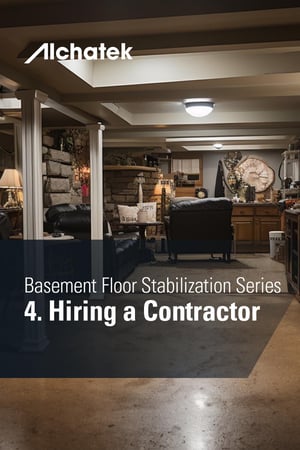 Your home's basement floor serves as an integral component of the structure, playing a pivotal role in maintaining the overall stability and integrity of the house. However, like all parts of a home, it's subject to wear and tear, and there are times when it might need professional attention. Recognizing these moments is crucial not just for the health of the structure but also for the safety of its inhabitants.
Your home's basement floor serves as an integral component of the structure, playing a pivotal role in maintaining the overall stability and integrity of the house. However, like all parts of a home, it's subject to wear and tear, and there are times when it might need professional attention. Recognizing these moments is crucial not just for the health of the structure but also for the safety of its inhabitants.
Spotting Signs of Floor Issues
While some basement floor problems can be glaringly obvious, others might be more subtle and require a discerning eye. Here are some practical tips to help homeowners identify potential issues:
- Unevenness: If you notice that your basement floor is starting to become uneven or if there are noticeable dips and bumps, it could be a sign of underlying issues related to voids or unstable soil.
- Cracks: While minor cracks can be a result of regular settling, significant or widening cracks might indicate more serious soil problems.
- Water Accumulation: Persistent moisture or puddles can be a sign of poor drainage or possible seepage issues. This can lead to more severe problems if not addressed promptly.
Selecting a Qualified Contractor
Once you've identified potential issues with your basement floor, the next step is to find a contractor who can address these problems effectively and efficiently. Here are some pointers to guide your search:
- Quality of Materials: Given the importance of the basement floor, it's essential that high-quality materials, such as those provided by Alchatek, are used. Confirm with the contractor about the products they intend to employ.
- Training: Ask the contractor if they have been trained in some way by the manufacturer of the polyurethane soil stabilization foam they will be using on the job.
- Experience and References: Make sure to ask the contractor for references from past stabilization projects. It's important that they have experience successfully completing similar scopes of work. Speaking with their past clients will help provide confidence in their capabilities.
Key Takeaways
- Your basement floor is more than just a part of your home; it's foundational to its structural health.
- Recognizing the signs of issues and acting promptly by engaging a qualified contractor can save homeowners significant costs in the long run. More importantly, it ensures the safety of everyone living in the house.
- Proactive action today can prevent more significant issues tomorrow.




 Ensuring the stability of your basement floor is an imperative task for every homeowner. Yet, in our pursuit of a sturdy home, it is crucial not to overlook the environmental ramifications of repair materials and methods. Balancing these dual responsibilities can be challenging, but with informed choices, homeowners can achieve both goals seamlessly.
Ensuring the stability of your basement floor is an imperative task for every homeowner. Yet, in our pursuit of a sturdy home, it is crucial not to overlook the environmental ramifications of repair materials and methods. Balancing these dual responsibilities can be challenging, but with informed choices, homeowners can achieve both goals seamlessly.

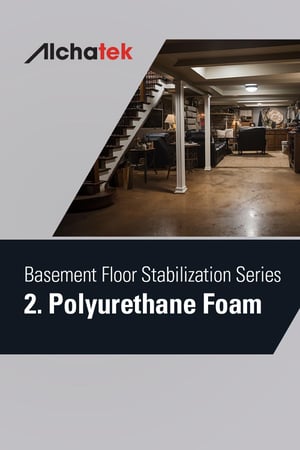 The basement, being one of the most vital components of a home, requires solutions that are both efficient and long-lasting when it comes to addressing unstable floor slab issues. Traditional methods of repair, although effective, can often be invasive, time-consuming, and expensive. Enter polyurethane foam—a revolutionary solution to basement floor slab stability issues.
The basement, being one of the most vital components of a home, requires solutions that are both efficient and long-lasting when it comes to addressing unstable floor slab issues. Traditional methods of repair, although effective, can often be invasive, time-consuming, and expensive. Enter polyurethane foam—a revolutionary solution to basement floor slab stability issues.
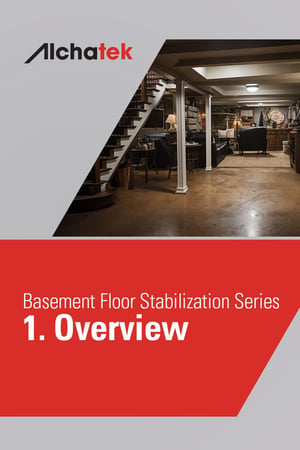 For many homeowners, a basement represents more than just a foundation—it's an extension of their living space, a storage haven, or even a cozy retreat. Ensuring the structural integrity and safety of your basement is paramount, not just for the sake of the basement itself but for the overall health and well-being of your home and its inhabitants. The basement floor is a critical component that plays a significant role in ensuring your basement is dry, stable, and safe.
For many homeowners, a basement represents more than just a foundation—it's an extension of their living space, a storage haven, or even a cozy retreat. Ensuring the structural integrity and safety of your basement is paramount, not just for the sake of the basement itself but for the overall health and well-being of your home and its inhabitants. The basement floor is a critical component that plays a significant role in ensuring your basement is dry, stable, and safe.
 In the world of warehouse and distribution center management, the condition of your concrete slabs is not a minor detail—it's a critical component that impacts safety, equipment longevity, and operational efficiency.
In the world of warehouse and distribution center management, the condition of your concrete slabs is not a minor detail—it's a critical component that impacts safety, equipment longevity, and operational efficiency.
 Choosing the right contractor for slab stabilization and leveling work in a warehouse or distribution center is a decision that carries significant weight. The quality of the repair work not only affects the immediate operational efficiency but also has long-term implications for safety, equipment longevity, and overall maintenance costs. A poor choice can lead to subpar work, requiring additional repairs and causing more operational disruptions. On the other hand, a skilled contractor can efficiently resolve floor issues, minimizing downtime and maximizing the lifespan of the repair.
Choosing the right contractor for slab stabilization and leveling work in a warehouse or distribution center is a decision that carries significant weight. The quality of the repair work not only affects the immediate operational efficiency but also has long-term implications for safety, equipment longevity, and overall maintenance costs. A poor choice can lead to subpar work, requiring additional repairs and causing more operational disruptions. On the other hand, a skilled contractor can efficiently resolve floor issues, minimizing downtime and maximizing the lifespan of the repair.
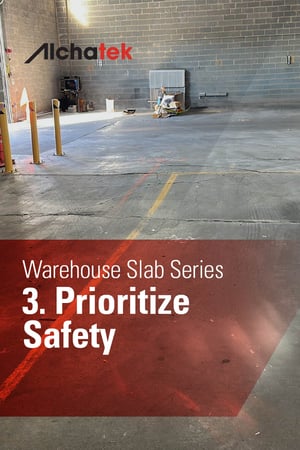 In the fast-paced environment of a warehouse or distribution center, safety is a paramount concern. One often overlooked factor that can significantly impact safety is the condition of the floor. Uneven or unstable floors can create hazards that put employees at risk. Tripping, slipping, and falling are just a few of the accidents that can occur when floors are in poor condition. Additionally, material-handling equipment like forklifts can tip over or lose control, leading to more severe accidents or even fatalities.
In the fast-paced environment of a warehouse or distribution center, safety is a paramount concern. One often overlooked factor that can significantly impact safety is the condition of the floor. Uneven or unstable floors can create hazards that put employees at risk. Tripping, slipping, and falling are just a few of the accidents that can occur when floors are in poor condition. Additionally, material-handling equipment like forklifts can tip over or lose control, leading to more severe accidents or even fatalities.
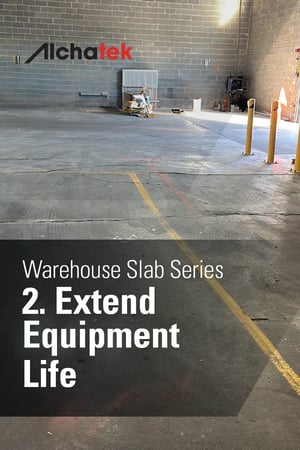 In a warehouse or distribution center, the condition of the floor can have a direct impact on the lifespan of material-handling equipment like forklifts, pallet jacks, and conveyors. Uneven or unstable floors can cause excessive wear and tear on these machines, leading to frequent breakdowns and increased maintenance costs. Over time, this can significantly reduce the lifespan of expensive equipment, necessitating premature replacements and adding to operational costs.
In a warehouse or distribution center, the condition of the floor can have a direct impact on the lifespan of material-handling equipment like forklifts, pallet jacks, and conveyors. Uneven or unstable floors can cause excessive wear and tear on these machines, leading to frequent breakdowns and increased maintenance costs. Over time, this can significantly reduce the lifespan of expensive equipment, necessitating premature replacements and adding to operational costs.
 Operational downtime in a warehouse setting has far-reaching consequences that go beyond the immediate financial losses. When a warehouse floor requires repair, the disruption to the supply chain can be significant. Suppliers and customers alike feel the impact of delays, and the ripple effect can damage relationships and erode trust. Additionally, downtime affects employee productivity and morale, leading to a potential decrease in work quality and an increase in turnover rates. In a just-in-time supply chain, even a brief period of downtime can result in stockouts at retail locations, leading to lost sales and damaged customer relationships.
Operational downtime in a warehouse setting has far-reaching consequences that go beyond the immediate financial losses. When a warehouse floor requires repair, the disruption to the supply chain can be significant. Suppliers and customers alike feel the impact of delays, and the ripple effect can damage relationships and erode trust. Additionally, downtime affects employee productivity and morale, leading to a potential decrease in work quality and an increase in turnover rates. In a just-in-time supply chain, even a brief period of downtime can result in stockouts at retail locations, leading to lost sales and damaged customer relationships.
 Uneven concrete slabs raise risks for retail establishments during crowded holiday shopping seasons. Unlevel concrete can easily cause tripping accidents, injuries, lawsuits, and disruptions. To mitigate these issues, retail owners need to address slab problems proactively before the holiday rush. Durable polyurethane concrete leveling is an optimal solution for lifting, stabilizing, and filling voids in sunken concrete.
Uneven concrete slabs raise risks for retail establishments during crowded holiday shopping seasons. Unlevel concrete can easily cause tripping accidents, injuries, lawsuits, and disruptions. To mitigate these issues, retail owners need to address slab problems proactively before the holiday rush. Durable polyurethane concrete leveling is an optimal solution for lifting, stabilizing, and filling voids in sunken concrete.